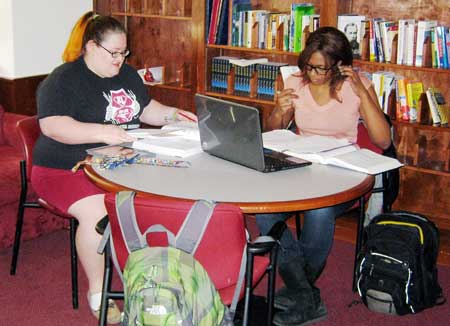Early College High School programs have been gaining a bit of buzz lately.

Studying in comfy residential hall libraries is only one aspect of campus life early college students have to look forward to, said NCCU hospitality and tourism major Taylor McKracken (left) and biology major Kyra Lyles. (Staff photo by Marcus Christon)
States from California to Texas to North Carolina have been paying attention to the concept of early college high schools, and their ability to make lasting impressions on the local communities they represent.
In North Carolina, the number of early college high schools is steadily increasing and there are now 73 of the schools calling the Tarheel State home.
Durham’s own Josephine Dobbs Clement Early College High School on the campus of N.C. Central University is only one example of successful early college high school programs.
Having earned the state Board of Education’s 2010 School of Distinction honor, the community’s early college is currently accepting applications for the 2013-2014 school year.
Applications are available on the school website and the deadline is February 20, 2013.
In the past decade many graduates have left the early college high schools and have a unique perspective on education.
While early college high schools attract students from diverse backgrounds, some students say that although the program is rigorous, most who apply themselves are able to complete successfully.
“The early college program is something that shouldn’t be taken lightly,” said Destiny Feemster, a Cleveland Early College graduate of 2012.
“You have to be prepared to work very hard, because your ultimate goal is to graduate with both a diploma and degree.”
This approach to education allows for students to save time and money by combining high school and college curriculum. As a result, students are able to graduate with either an associate’s, or two-year degree, or a large number of transferable college credits.
Since some students choose not to go to college after completing high school, early college programs can help promote and ease the transition into college for those students who eventually choose to do so.
“I was unable to graduate with an associate’s degree,” said Christopher Benson, a Cleveland Early College alumnus who graduated in 2012.
“But I was fortunate to be able to transfer my credits from my program and enter NCCU as a second semester sophomore,” he said.
One major component of early colleges that graduates say is a positive, is that tuition is completely free for students attending these high schools. Some graduates said that with rising tuition costs around the country, emerging from an early college with a two-year degree saves them thousands.
“I am so thankful for the early college program because college tuition is so expensive,” said Malia Little, an Anson County Early College alumna from the 2011 graduating class.
Little majors in Mass Communications, and says that the books can be quite pricey.
“Because I received two years of free college, that means I will not have to take out as many student loans,” she said.
Within the early college high school system, graduation rates are increasing while dropout rates decrease. According to N.C. New Schools, an initiative that readies students for college and careers, early college high schools have a dropout rate of 0.54 percent.
According to the state public schools website, the 2011- 2012 consolidated data report shows that the current dropout rate for all N.C. high schools stood at 3.01 percent last year.
Local graduates of early colleges praise the differences the institutions have had in the community and their lives. They say the simple experience of small class sizes and “real” campus life help a great deal in learning.
“The fact that early colleges have smaller class sizes means that students are able to receive more assistance from their teachers,” said Jalen Baker, a 2011 Josephine Dobbs Clement Early College alumnus.
“Mathematics was never my favorite subject,” Baker said. “But I feel like I was able to get the attention that I deserved at the early college.”
“Because of that, I was able to be successful in math and this program,” he said.
Local community members have also noticed the impact of an early college program and share the graduate sentiments about this style of education.
“I cannot say enough about JDC-ECHS,” said Krista Stanberry, a Durham resident and aunt to a JDC-ECHS student. “I have a niece that has attended the school and she is doing very well.”
Stanberry said she sees “love and support” given to students from the staff at the school and that instructors are dedicated.
“The teachers work very hard to ensure that every child receives attention, especially the students that want to go on to higher education,” she said.
The early college high school initiative began in North Carolina back in 2004 and seems to be changing the futures of the students and communities being served.
Little said the opportunity for students to dually enroll in a high school and college program has been invaluable and it offers students the chance to excel in a cheaper, faster manner.
“I left early college with a mindset that better prepared me to handle a four-year institution,” said Little. “I have a strong work ethic and I owe that to the early college program.”
By: Marcus Christon
NCCU Staff Writer
thedurhamvoice@gmail.com